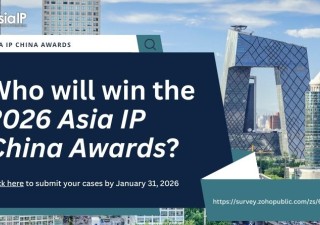Will AI bring the death of IP enforcement work?
31 August 2023
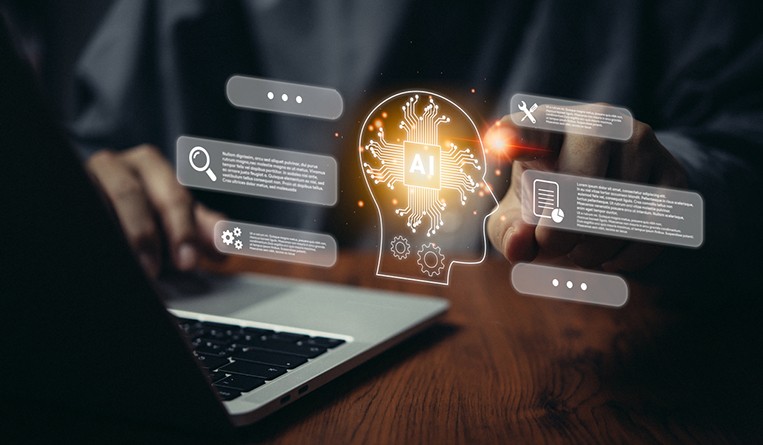
With the development of AI, there is an ongoing discussion on whether AI can replace human intelligence and decision-making. — Espie Angelica A. de Leon
Will artificial intelligence be the end of IP enforcement work? For our interviewees, the answer is a resounding “No.”
Seiro Hatano, a partner at TMI Associates in Tokyo, touched on the topic during one of the sessions held during the 2023 INTA Annual Meeting Live+ in Singapore in May.
Speaking at the session titled “Welcome to the Future: Emerging IP Issues Relating to AI and Its Impact on Brands,” Hatano said: “From an enforcement perspective, the market of the counterfeit will be such a huge market. Still, artificial intelligence is very useful for enforcement work, so I’m a bit concerned that AI may bring the death of enforcement work.”
Using AI in IP enforcement
“AI has been used for many years by individual platform operators in the IP enforcement landscape to provide services to their customers,” said Thomas J. Treutler, partner and managing director at Tilleke & Gibbins in Hanoi and Ho Chi Minh.
AI performs tasks involved in IP enforcement, streamlines the work and adds efficiency to the process. Thus, lawyers have more time to strategize and focus on the creative aspects of enforcement.
The technology is already used to monitor and analyze databases and digital content to detect infringing goods online. IP infringement is now mostly happening online with the shift in consumer behaviour following the Covid-19 global outbreak. It is being tapped to trace these goods’ distributors and track infringers’ activities.
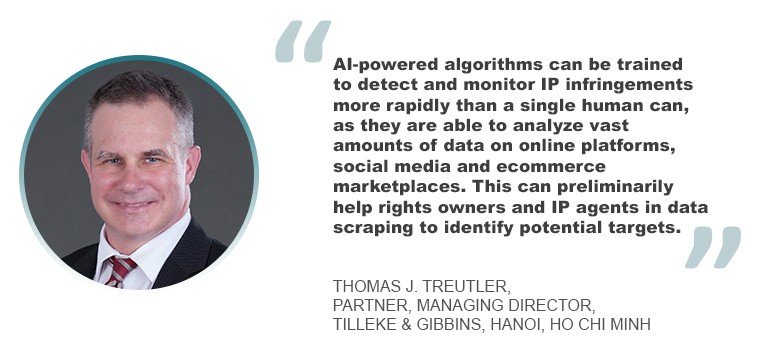
“AI-powered algorithms can be trained to detect and monitor IP infringements more rapidly than a single human can, as they are able to analyze vast amounts of data on online platforms, social media and ecommerce marketplaces. This can preliminarily help rights owners and IP agents in data scraping to identify potential targets,” said Treutler.
AI is also used to report infringing goods to platformers and assist in other tasks.
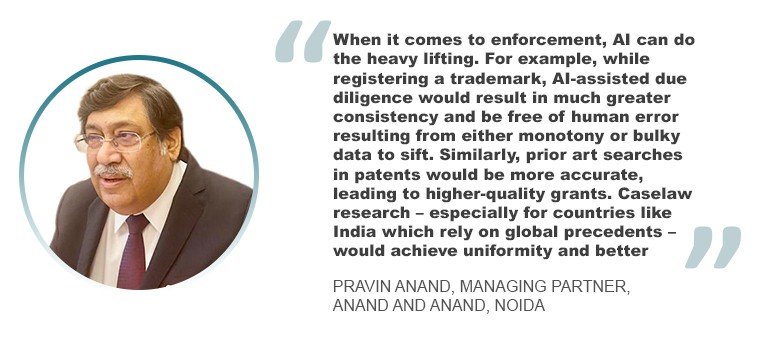
“When it comes to enforcement, AI can do the heavy lifting,” said Pravin Anand, managing partner at Anand and Anand in Noida. “For example, while registering a trademark, AI-assisted due diligence would result in much greater consistency and be free of human error resulting from either monotony or bulky data to sift. Similarly, prior art searches in patents would be more accurate, leading to higher-quality grants. Caselaw research – especially for countries like India which rely on global precedents – would achieve uniformity and better decisions.”
AI won’t kill enforcement work
Despite the impact of AI on IP enforcement work, our interviewees believe it won’t bring about its death.
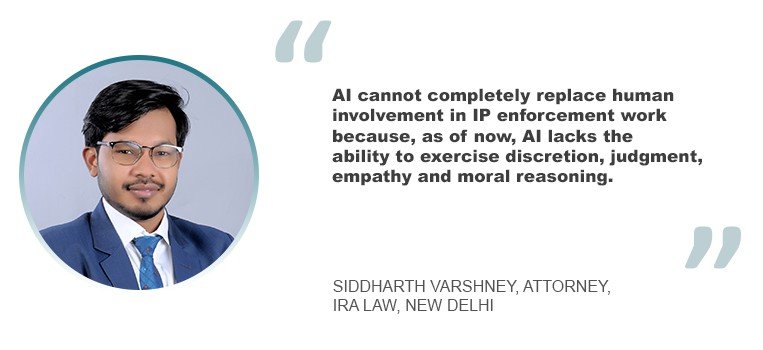
“AI cannot completely replace human involvement in IP enforcement work because, as of now, AI lacks the ability to exercise discretion, judgment, empathy and moral reasoning,” said Siddharth Varshney, an attorney at Ira Law in New Delhi.
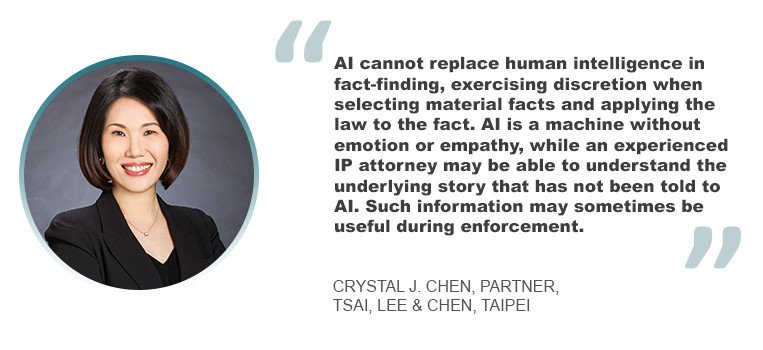
“AI cannot replace human intelligence in fact-finding, exercising discretion when selecting material facts and applying the law to the fact,” added Crystal J. Chen, a partner at Tsai, Lee & Chen in Taipei. “AI is a machine without emotion or empathy, while an experienced IP attorney may be able to understand the underlying story that has not been told to AI. Such information may sometimes be useful during enforcement.”
According to Anand, AI may function as an able assistant but, ultimately, the decision must be made by the lawyer in the end.
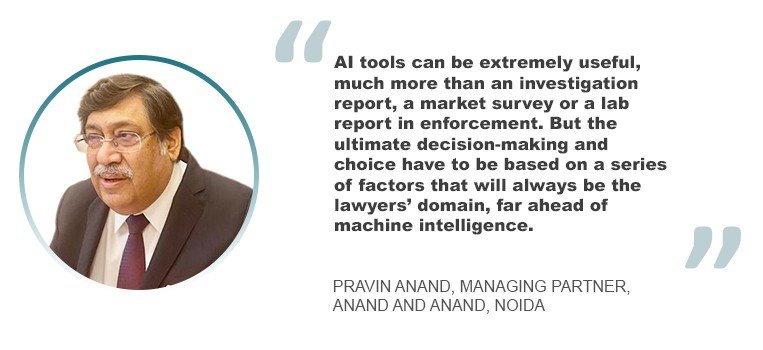
“AI tools can be extremely useful, much more than an investigation report, a market survey or a lab report in enforcement. But the ultimate decision-making and choice have to be based on a series of factors that will always be the lawyers’ domain, far ahead of machine intelligence,” he said.
Should one disclose a particular fact, or is it irrelevant? Should one use a stockist? Is “Diwali” the right time to bring action? How would the judge react to multiple defendants in one suit? These are just some of the questions where answers are critical and where decisions have to be made, according to Anand.
“In addition, taking legal action requires human actions; for example, filing a complaint with the police or handling litigation proceedings in court. Therefore, it will not replace IP professionals in enforcement actions,” said Treutler.
Although he expressed concern over the possibility of AI causing the death of enforcement at the 2023 INTA Annual Meeting in Singapore, Hatano noted he believes it would take some time for AI to take over enforcement. He explained that this is because many of the enforcement works are on a case-by-case basis, depending on the infringing goods or the response of the adverse party.
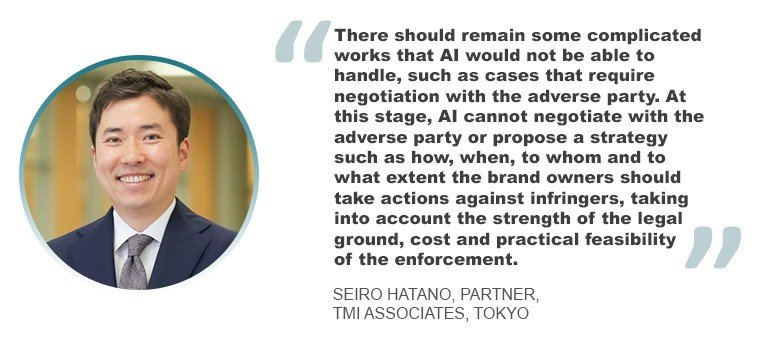
“There should remain some complicated works that AI would not be able to handle, such as cases that require negotiation with the adverse party. At this stage, AI cannot negotiate with the adverse party or propose a strategy such as how, when, to whom and to what extent the brand owners should take actions against infringers, taking into account the strength of the legal ground, cost and practical feasibility of the enforcement,” explained Hatano.
“AI is not a problem in the near future as various mechanisms and complete intelligence will take decades to develop,” said Ram Chandra Subedi, founding and managing partner at Apex Law Chamber in Kathmandu. “However, it can disrupt enforcement in the far future, so we must be prepared to face the challenges that will be created by it.”
Challenges ahead
Indeed, current R&D activities on modern technologies such as AI are poised to usher advances that will help shape the future of the IP world. Somewhere down the line, a disruption is bound to occur in the IP enforcement space.
AI-wise, recent advances involve working with large language models (LLM), a type of AI system that recognizes, understands, interprets and generates language. LLM is the technology that lies at the foundation of ChatGPT. Ultimately, efforts will lead to the development of generative AI that generates text in a human-like fashion.
“If it is further trained to search online content, such as product descriptions, reviews and social media posts across platforms in real-time, to identify instances of IP infringement, it will revolutionize IP enforcement works in the near future,” said Treutler.
He claimed it’s possible, citing their firm’s belief that in the near future, AI can be further trained in analyzing complex information to identify patterns and connections that may indicate IP infringement across several platforms. At present, online searches and investigations conducted by AI appear to be effective internally, but only on specific platforms or websites. It remains a challenge for AI to effectively conduct online searches, investigations and analyze information across several platforms, revealed Treutler. But as mentioned above, their firm is optimistic about AI’s potential.
“As the digital economy grows, instances of piracy and online infringements will reach epidemic proportions. With advanced AI tools, one can detect infringements and thus turn to the formulation of better strategies to curb this menace. Machine learning and other AI technologies promise the discovery of patterns that the human eye can miss,” said Anand.
Although he also does not think AI signals the death of IP enforcement, Subedi believes certain steps should be made to ensure enforcement work remains alive with the prevalence of AI. One of these is the development of an extensive legal framework related to AI.
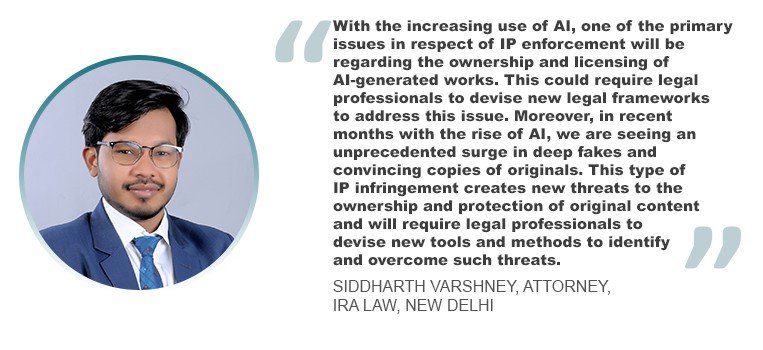
“With the increasing use of AI, one of the primary issues in respect of IP enforcement will be regarding the ownership and licensing of AI-generated works,” stressed Varshney. “This could require legal professionals to devise new legal frameworks to address this issue. Moreover, in recent months with the rise of AI, we are seeing an unprecedented surge in deep fakes and convincing copies of originals. This type of IP infringement creates new threats to the ownership and protection of original content and will require legal professionals to devise new tools and methods to identify and overcome such threats.”
Another needed step, according to Subedi, is the conduct of governance research and the implementation of its outcome.
“The development of AI can be shaped by policy, norm-building and other governance mechanisms as a second method for lowering risks from it. Professionals involved in the enforcement work must lobby for governance mechanisms of AI and adapt to understand the AI-related aspects of IP,” said Subedi.
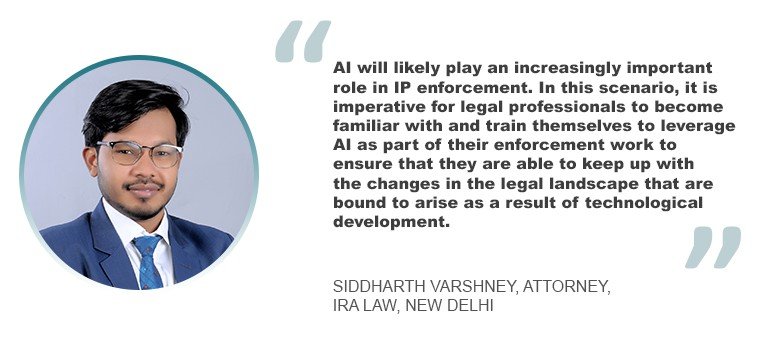
“AI will likely play an increasingly important role in IP enforcement,” said Varshney. “In this scenario, it is imperative for legal professionals to become familiar with and train themselves to leverage AI as part of their enforcement work to ensure that they are able to keep up with the changes in the legal landscape that are bound to arise as a result of technological development.”
Subedi laments that AI is not as widely developed and used in Nepal as in other countries. Not many businesses in the country are engaged in the AI industry. There also hasn’t been significant progress of going paperless in government and eliminating lengthy lines for transactions. Only a few public and commercial sectors have been “digitalized.”
“However, the exposure of ChatGPT is increasing in the general public. The use of AI can also be seen in banks and restaurants, for example, the use of robot waiters,” shared Subedi.
AI is upon us, maybe in varying degrees among the community of nations. Nevertheless, it is now a fixture in our modern world, and it will continue to evolve and advance, affecting the various components of IP work accordingly. Whether it will eventually bring the death of enforcement or not remains to be seen. IP professionals should instead focus on how they can adapt to the changes and shifts caused by AI’s evolution and the steps they need to take to get ahead of these developments. After all, the IP world cannot play catch up all the time.
- Espie Angelica A. de Leon




